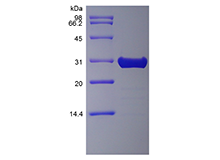Murine FGF-8 is a heparin binding growth factor belonging to the FGF family, which plays a central role during prenatal development, postnatal growth and regeneration of a variety of tissues, by promoting cellular proliferation and differentiation. Murine FGF-8 is first purified from an androgen-dependent mouse mammary carcinoma cell line as an androgen induces secretion. Cloning and analysis of the murine FGF8 gene revealed at least eight potential protein isoforms (FGF-8a-h). Murine FGF-8a and b share 100 % amino acid identity with that in humans, and murine FGF-8e and f share 98 % amino acid identity with humans. None of the FGF-8 isoforms exhibited activity to FGFR1b, 2b, 3b, but FGFR2c, 3c and FGFR4 can be activated by several FGF-8 isoforms. FGF-8 plays an important role in the regulation of embryonic development, cell proliferation, cell differentiation and cell migration, and it is required for normal brain, eye, ear and limb development during embryogenesis.

